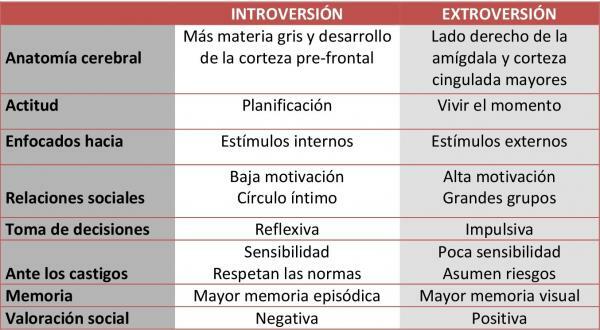
The concept of personality refers to a set of personality traits and characteristics of a person that determine your behavior and way of acting in different situations and, in addition, allows you to differentiate yourself from others people. If you want to go deeper into this concept and know the main characteristics of the personality, do not hesitate to continue reading this article from Psychology-Online: 15 personality characteristics.
Index
- What is personality
- Personality as a whole
- Individualistic personality
- Consistent personality
- Differentiating personality
- Evolutionary personality
- Non-predictive personality
- Adaptive personality
- Personality and thoughts
- Personality and culture
- Personality and biological influences
- Personality and experience
- Personality and social construction
- Abstract personality
- Measurable personality
- Personality based on five dimensions
What is personality.
Personality is understood as the particular diversity that characterizes each person and the difference from the others. It is an individual psychological variable formed by a
Although each individual has their own personality and there is no identical personality to another, we must emphasize that there are a series of exact characteristics for all personalities. In addition, these common factors can help us better understand the concept of personality, below we explain the 15 main characteristics of the personality that you should know.
1. Personality as a whole.
This personality characteristic refers to the conception of personality as the construction of a set of personality traits and characteristics of a person, which give rise to an internal organization that allows us to determine the way of acting of each person based on the situation and the context in which it originates.
2. Individualistic personality.
Although personality is defined at a global level, it should be noted that its definition is individualistic. The general definition shows that the set of traits and characteristics of people is what makes up the personality, but individualism takes the main role when These traits and characteristics of people are broken down and adapted to each person based on what they demonstrate with their actions and behaviors in different situations. Namely, in each person some traits or others will predominate and in different degrees, giving rise to unique personalities.
3. Consistent personality.
Another of the common characteristics of the personality is its persistence and constancy, that is, that the personality lasts over time. Personality remains more or less stable throughout people's lives, although changes can always be made as time progresses. In addition, the fact of being more or less constant implies that, on some occasions, the way in which each person will act or behave can be predicted.
It should be noted that some personality traits may predominate and manifest themselves eventually or temporarily depending on the characteristics of the situation in which the person finds himself. Instead, there are other traits that are permanent and stable that occur on a regular basis. That is, sometimes, people face unexpected and spontaneous situations that make them act improvised, giving rise to temporary and specific features.
4. Differentiating personality.
Personality is also characterized by being the brand of identification of each individual, leading to a differentiation between people, since, as we have said before, there are no two exact personalities. Therefore, personality is an element that allows us to differentiate people from others. Ultimately, personality is what allows us to identify each individual as unique and exclusive people.
5. Evolutionary personality.
We must also take into account evolution as a characteristic of personality. Thus, although the personality is a stable component over time, changes and variations can arise. Sometimes, as time goes on, the personality also advances and changes, and these changes may be due to the maturation of the individual, age, environmental factors and experience, among others.
6. Non-predictive personality.
We have previously commented that on some occasions, thanks to the stability of the personality, we can predict the behavior of people in different situations. Well, on the contrary, the non-prediction of the personality is also one of the characteristics of the personality. For the combination of the traits, behaviors and characteristics of the person, makes it difficult to predict the answer of each person in different situations.
7. Adaptive personality.
Another of the great characteristics of the personality is its adaptation to the environment. Namely, personality allows people to adapt and adjust to different situations and vital circumstances. Thus, personality allows people to solve their problems by responding to them in a way adapted to the circumstance in which it occurs. In addition, it is important to bear in mind that if there are alterations or difficulties in the adaptation of people in relation to their environment, it may be due to some type of personality disorder.
8. Personality and thoughts.
We must also take into account the role of thoughts when we talk about the characteristics of the personality, since personality is influenced by ways of thinking of individuals. The thoughts related to our own capacities and our own idea of ourselves as individuals in In general, they are the thoughts that can influence the construction and the changes that occur in the traits of personality. For example, if a person thinks that he is not capable enough to do things well and always has thoughts in mind that make him doubt his decisions and their actions, this may affect the personality giving rise to a person who is insecure and, therefore, the trait of personality unsafety.
9. Personality and culture.
Culture is a factor that can greatly influence the personality of individuals. It is common for the result of education and cultural patterns affect the construction of personality in the first years of people's lives. In addition, the personality determines the actions and behaviors of people, a fact that can be see interfered with by culture, this being a limiting factor in the way of acting of the people.
10. Personality and biological influences.
Another of the characteristics of the personality that we must take into account is the role they play biology, heredity and genetics, since these factors are decisive when it comes to building personality. Personality is not determined solely by genetics, but it is a factor that influences large measurements. Therefore, we must know the term temperament, which refers to the styles of behavior and emotional relationships that appear from childhood, as it turns out that people's temperament is due to biological influences.
11. Personality and experience.
Personality develops as time passes. For this reason, the experiences that are lived, especially in childhoodThey are decisive in the construction of personality. Thus, each person lives different experiences and faces them in different ways, so experiences allow people to develop towards their own personality.
12. Personality and social construction.
When we propose to define a person based on their personality, even if this is an internal concept, we We have to describe it from an external perspective, that is, by what the person shows us with her attitudes and behaviors of him. What's more, personality allows us to enter an interpersonal dimension and relate to other people, since according to your personality you can have more or less affinity with certain personalities of other people. Thanks to an affinity between personalities, we can share concerns, achievements, tastes, among others, with all those around us with whom such an affinity is demonstrated.
13. Abstract personality.
Another characteristic of the personality is the fact that it is an abstract concept. The personality concept it is difficult to define and delimit since it is something abstract, that we cannot see or touch, we can simply deduce what the personality of each is like individual based on the observation of his behaviors and attitudes when he responds to different stimuli and situations.
14. Measurable personality.
Personality is also characterized by being measurable, that is, there are different instruments that can assess personality, personality traits and characteristics of a person. Usually, the personality is usually evaluated in job interviews to know if the candidate is suitable or not for the job (by means of questions, tests ...), it is also evaluated to determine if a person suffers from some type of personality disorder, among others. If you want to evaluate your personality traits you can do this personality test.
15. Personality based on five dimensions.
One of the most prestigious and used instruments to assess personality is the so-called NEO-PI-R. This assessment instrument comprises five major dimensions that determine the personality of individuals and is has become one of the most sustained and used personality assessments by most of the specialists. This personality test is based on the five factor model, which are explained below:
- Neuroticism. The first dimension to take into account allows us to observe the tendency of the individual to experience feelings and negative emotions, among which we find melancholy, shame, anger, guilt, disgust, among others.
- Extraversion. The extroverts They are sociable people, who like excitement and stimulation, tend to be cheerful, are spirited, energetic, optimistic, and so on.
- Opening. The third dimension refers to characteristics of people such as the search for sensations and the search for new experiences.
- Amiability. Fourth, we find the dimension of personality, which allows us to observe the interpersonal tendencies of individuals. This dimension aims to evaluate aspects such as altruism, sympathy with others, the predisposition to help others, among others.
- Responsibility. Finally, we find the dimension of the personality that tries to evaluate if the individual is willful, determined, if he has the will to achieve, among others.
This article is merely informative, in Psychology-Online we do not have the power to make a diagnosis or recommend a treatment. We invite you to go to a psychologist to treat your particular case.
If you want to read more articles similar to 15 personality characteristics, we recommend that you enter our category of Personality.
Bibliography
- Costa, P. T, and McCrae, R. R. (s.f.). NEO PI-R. Neo Personality Inventory - Revised.
- Cloninger, S.C. (2002). Personality theories. 3rd Edition. Pearson: Prentice Hall.


